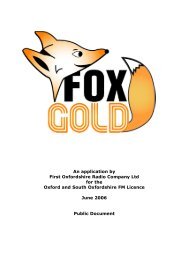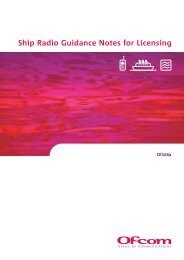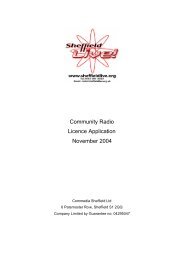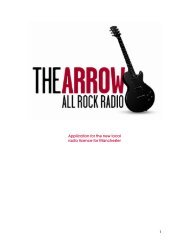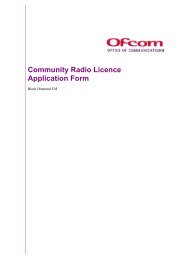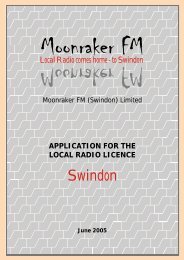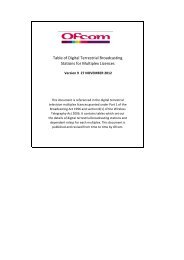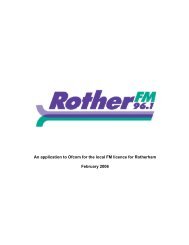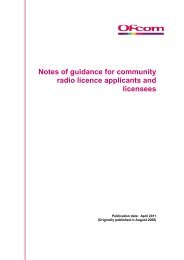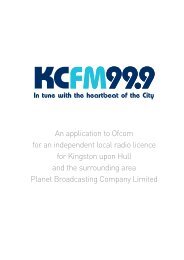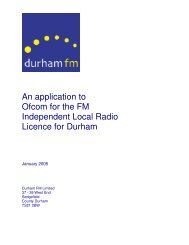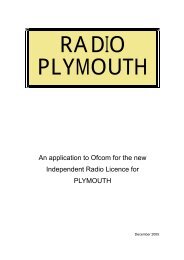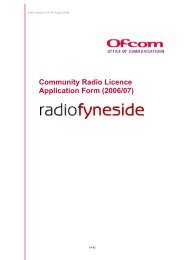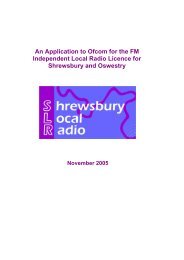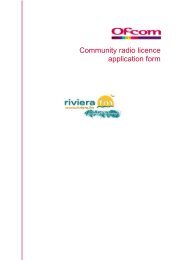Programme Making and Special Events ... - Ofcom Licensing
Programme Making and Special Events ... - Ofcom Licensing
Programme Making and Special Events ... - Ofcom Licensing
You also want an ePaper? Increase the reach of your titles
YUMPU automatically turns print PDFs into web optimized ePapers that Google loves.
www.ofcom.org.uk OfW64<br />
1 Introduction<br />
This information sheet is aimed at programme-makers <strong>and</strong><br />
others wishing to use radio at entertainment, public <strong>and</strong><br />
sporting events.<br />
What is PMSE?<br />
‘<strong>Programme</strong> making <strong>and</strong> special events’ (PMSE) is a broad<br />
term that covers:<br />
• the making of a programme for broadcast;<br />
• the making of a film, presentation, advertisement or<br />
audio/video tape; <strong>and</strong><br />
• the staging or performance of a special event. (<strong>Special</strong><br />
events – for example, entertainment <strong>and</strong> sporting events,<br />
music <strong>and</strong> religious festivals, <strong>and</strong> air, agricultural <strong>and</strong> county<br />
shows – typically last between one day <strong>and</strong> a few weeks.)<br />
A PMSE licence allows you to use a wide range of radio<br />
equipment that is suitable for the above applications.<br />
A PMSE licence does not cover the use of radio apparatus for<br />
general communications supporting a production or event<br />
(e.g. security, safety or catering services). These uses are<br />
covered by other types of radio licence such as Private<br />
Business Radio, Public Mobile Communications <strong>and</strong> Citizens’<br />
B<strong>and</strong>. The Fixed Services <strong>and</strong> Satellite Services licensing<br />
arrangements may also apply in some cases. For information<br />
about any of these licences, contact <strong>Ofcom</strong> or visit our<br />
website – see Section 7.<br />
What is <strong>Ofcom</strong>?<br />
<strong>Ofcom</strong> (the Office of Communications) is the UK’s new<br />
communications industry regulator, with wide-ranging<br />
responsibilities across the UK’s communications markets. An<br />
independent regulatory body, in December 2003 <strong>Ofcom</strong><br />
inherited the Radiocommunications Agency’s responsibility<br />
for managing the UK civil radio spectrum.<br />
<strong>Programme</strong> <strong>Making</strong> <strong>and</strong> <strong>Special</strong> <strong>Events</strong><br />
(Including Radio Microphones)<br />
(previously Radiocommunications Agency information sheet RA 325)<br />
Page 1 of 3<br />
2Do I need a licence?<br />
a) <strong>Licensing</strong> requirements<br />
It is illegal to use a radio transmitter unless:<br />
• you have a licence issued under the Wireless<br />
Telegraphy Act 1949; or<br />
• the transmitter equipment is specifically exempted<br />
from licensing (see Section 5).<br />
Unauthorised use of equipment could lead to immediate<br />
termination of use, a fine of up to £5,000 <strong>and</strong>/or six<br />
months’ imprisonment on summary conviction, or an<br />
unlimited fine <strong>and</strong> two years’ imprisonment <strong>and</strong><br />
forfeiture of equipment on conviction on indictment.<br />
b) Who should hold the licence?<br />
The PMSE licence should be held by the person who<br />
intends to use, or to control those who use, the<br />
licensed equipment.<br />
If a company holds a licence, its employees are covered<br />
by that licence.<br />
If anyone other than the licensee or the licensee’s<br />
employees is to use the equipment, the licensee must:<br />
• give that person written authority to do so; <strong>and</strong><br />
• ensure that the person complies with the licence<br />
conditions.<br />
A company hiring out radio microphones may hold a<br />
licence itself <strong>and</strong> authorise its customers to use those<br />
microphones. It will need to issue each customer with a<br />
written permit, subjecting him/her to the licence<br />
conditions. Copies of a model permit (SAP3) are available<br />
from JFMG – see Section 7.
c) Applying for a licence<br />
Under the Communications Act 2003, <strong>Ofcom</strong> is now<br />
responsible for issuing licences for radio equipment.<br />
(However, this does not affect the validity of licences<br />
issued by or on behalf of the Radiocommunications<br />
Agency before the end of 2003.)<br />
<strong>Ofcom</strong> has contracted JFMG Ltd to manage <strong>and</strong> license<br />
the radio spectrum used for PMSE. This means that JFMG<br />
is authorised to grant PMSE licences on <strong>Ofcom</strong>’s behalf.<br />
To apply for a licence, write to JFMG at the address given<br />
in Section 7, explaining the type of radio use you are<br />
interested in. You will be sent an application form <strong>and</strong><br />
further information on your licensing options. You can<br />
also download application forms from the JFMG website<br />
(www.jfmg.co.uk).<br />
When you apply for a licence, or for an additional<br />
frequency assignment, you must enclose the full fee (see<br />
below). You can pay by cheque (made payable to “JFMG<br />
Ltd Trust Account” or by credit/debit card.<br />
If your application needs to be processed outside normal<br />
working hours (9am to 5pm, Monday to Friday excluding<br />
bank holidays), you will have to pay an extra £55 per<br />
frequency assignment.<br />
d) Licence fees<br />
Until the end of 2003, licence fees were set in<br />
Regulations made by the Secretary of State for Trade <strong>and</strong><br />
Industry. Any changes to fees made since then have been<br />
set in regulations made by <strong>Ofcom</strong>, <strong>and</strong> have been placed<br />
in Parliament in accordance with new procedures under<br />
the Communications Act 2003. Licence fees are generally<br />
reviewed annually.<br />
Details of the current licence fees can be obtained from<br />
JFMG or <strong>Ofcom</strong> – see Section 7.<br />
3 Spectrum available for PMSE<br />
A wide range of spectrum is available for licensing. This is<br />
listed in JFMG’s register of frequencies, available free of<br />
charge from JFMG – see Section 7.<br />
When you apply for a licence, JFMG will contact you to<br />
discuss your requirements <strong>and</strong> the features of the equipment<br />
Page 2 of 3<br />
you wish to use, so that you can be assigned the most<br />
suitable frequencies for you (subject to availability).<br />
4 Equipment requirements<br />
Licensed equipment must comply with UK Radio Interface<br />
Requirement IR2038, <strong>and</strong> with the Radio Equipment <strong>and</strong><br />
Telecommunications Terminal Equipment (R&TTE) Directive.<br />
IR2038 <strong>and</strong> a document entitled Guidance for Manufacturers<br />
on the Introduction of the R&TTE Directive are available free of<br />
charge from <strong>Ofcom</strong> – see Section 7.<br />
5 Licence-exempt equipment<br />
The following types of equipment may be suitable for PMSE<br />
but do not require a licence:<br />
• Wide-b<strong>and</strong> radio microphones with a 0 of 10mW or less<br />
do not need licensing, as long as they operate on the<br />
frequencies 173.8, 174.1, 174.5, 174.8 <strong>and</strong> 175.0 MHz. They<br />
must also conform to the specification MPT 1345 or ETSI<br />
Specification EN 300 422.<br />
• Low-power cordless audio equipment may be operated in<br />
the range 863 to 865 MHz, with a maximum power of<br />
10mW. Equipment must conform to the ETSI Specification<br />
EN 300 220-1.<br />
• Low-power video applications may be operated at 1394<br />
MHz, with a maximum power of 500mW <strong>and</strong> a 10 MHz<br />
b<strong>and</strong>width. Equipment must conform to the specification<br />
MPT 1349.<br />
• Low-power visual image transmission equipment may be<br />
operated in the range 2.400 to 2.483 GHz, with a maximum<br />
power of 10mW <strong>and</strong> a 20 MHz b<strong>and</strong>width. Equipment<br />
must conform to the ETSI Specification I-ETS 300 440.<br />
• A number of b<strong>and</strong>s for low-power telemetry <strong>and</strong><br />
telecomm<strong>and</strong> devices are exempt from licensing.<br />
• PMR 446 is a licence-exempt, short-range voice<br />
communication system, providing a basic radio service for<br />
both business <strong>and</strong> non business users. PMR 446 has replaced<br />
the Short Range Business Radio (SRBR) speech service.<br />
Information sheets OfW69 (Short-Range Devices) <strong>and</strong><br />
OfW57 (PMR 446) contain further information on licenceexempt<br />
equipment.<br />
6 Complaints <strong>and</strong> suggestions<br />
If you have a complaint or a suggestion about PMSE<br />
licensing, please contact JFMG – see Section 7.
If you cannot resolve a complaint with JFMG, you may write to:<br />
<strong>Ofcom</strong><br />
<strong>Programme</strong> <strong>Making</strong> <strong>and</strong> <strong>Special</strong> <strong>Events</strong> Section<br />
Riverside House<br />
2a Southwark Bridge Road<br />
London<br />
SE1 9HA<br />
Tel: 020 7981 3192/3085/3184<br />
E-mail: pmse@ofcom.org.uk<br />
In considering disputes about licensing matters, we will<br />
require JFMG to explain the reasons for the action that is the<br />
subject of the dispute. We will decide how the dispute<br />
should be resolved, <strong>and</strong> give reasons for its decision – which<br />
will be binding on JFMG.<br />
7 Further information<br />
For PMSE licence applications <strong>and</strong> enquiries about PMSE<br />
licensing, please contact:<br />
JFMG Ltd<br />
33-34 Alfred Place<br />
London<br />
WC1E 7DP<br />
Tel: 020 7299 8660<br />
Fax: 020 7299 8661<br />
E-mail: info@jfmg.co.uk<br />
Website: www.jfmg.co.uk<br />
The JFMG office is open 9am to 6pm, Monday to Friday (except<br />
bank holidays). Outside these hours a co-ordinator (tel. 07050<br />
177335) is available for emergency frequency assignments.<br />
<strong>Ofcom</strong> produces a range of information sheets, UK Radio<br />
Interface Requirements <strong>and</strong> other publications. These are<br />
available free of charge on our website (www.ofcom.org.uk),<br />
or hard copies can be ordered from:<br />
<strong>Ofcom</strong> Contact Centre<br />
Riverside House<br />
2a Southwark Bridge Road<br />
London<br />
SE1 9HA<br />
Tel: 0845 456 3000<br />
Fax: 0845 456 3333<br />
E-mail: contact@ofcom.org.uk<br />
Page 3 of 3<br />
Riverside House<br />
2a Southwark Bridge Road<br />
London SE1 9HA<br />
Switchboard +44 (0)20 7981 3000<br />
Facsimile +44 (0)20 7981 3333<br />
www.ofcom.org.uk<br />
Ref: OfW.64/Fol.067_01/04



